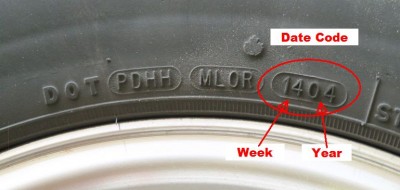 The Importance of Compatibility and Understanding Weight Ratings and Weights
The Importance of Compatibility and Understanding Weight Ratings and Weights
By Gary Bunzer, the RV Doctor
So you’ve done your due diligence and have decided to enter the towable recreation vehicle lifestyle. You already know that any non-motorized RV is considered a towable, including a slide-in pickup camper. Folding camping trailers, conventional travel trailers, slide-in campers and fifth-wheel trailers all require some type of tow vehicle, typically a pickup truck or perhaps a heavier, dedicated hauler used only for towing.
Safety is absolutely paramount when pairing any tow vehicle with any towable RV. Obtaining a proper match is a matter of understanding each vehicle’s requirements, your preferences, deciphering weight labels and performing a little simple math. It is certainly not a passive procedure, and while some dealers are very good at assisting the RVer with making the right match, others are not. Ultimately, it is up to you to make the buying decisions so the better educated you are in weight compatibility, the safer you will be on the highway.
Often the RVer will already own a suitable pickup, SUV or other tow vehicle and will begin a quest to find a trailer or camper to tow or haul. Other times, the RVing family may have found the perfect coach with all the necessary features and accessories, and now must choose the tow vehicle that will safely tow or carry that unit down the road.
Deciphering the Lingo
Weight ratings are a language all unto themselves. Let’s begin with a few definitions the proactive RVer should know when pairing an RV and tow vehicle….or vice versa!
GCWR (Gross Combination Weight Rating) – Probably the most important number to take into consideration. This is the limiting number that includes the total weight of the RV as well as the tow vehicle itself.
- GVWR (Gross Vehicle Weight Rating) – The tow vehicle and the RV will have separate GVWRs. The GVWR of the towable RV will be conspicuously posted on the left front exterior section of the RV.
- GAWR (Gross Axle Weight Rating) – Every individual axle (on the truck and on the RV), will have a dedicated GAWR. It is the maximum rated load that axle can safely support. It assumes, however, that both ends of that axle will be carrying an equal load, which isn’t always the case.
- UVW (Unloaded Vehicle Weight) – Typically the weight of the vehicle as it rolled out of the factory. It does not take into account any cargo, fresh water, propane, dealer installed options or people and pets.
- NCC (Net Carrying Capacity) – This number will be found on older RVs (pre-2000). It’s basically the maximum limit of all the cargo you put into the RV; every can of beans, fresh water, propane, the bowling ball collection, occupants, pets, etc. All your stuff!
- CCC (Cargo Carrying Capacity) – The new NCC.
Also, keep in mind that tire, axle, suspension, hitch and accessory manufacturers also assign a maximum weight rating for their particular equipment. The combined towing configuration must consider all these ratings and stay under the respective maximum load at each link in the “chain.”
Just about every truck manufacturer publishes a towing guide, outlining the special requirements needed (if any) by that particular vehicle as well as all its limitations. Begin by looking at the tow vehicle’s GCWR. Other important numbers to consider when matching a tow vehicle to the ideal RV:
Curb Weight – The weight of the tow vehicle including all fluids, oils, lubricants and a full tank of fuel. It does not include the driver, passengers, cargo or added equipment.
- Dry Weight – The weight of the stock tow vehicle.
- Payload – Similar to CCC; determined by subtracting the curb weight from the GVWR.
- VL or VLR (Vertical Load Rating) – Similar to payload, it must exceed the actual tongue weight, kingpin weight or total weight of the camper. It’s also the maximum vertical load put on a hitch assembly.
Weights and Weight Labels
Listing the cargo carrying capacities for towables is currently a National Highway Traffic Safety Administration (NHTSA) standard. And since we’re talking about towable RVs only, we’ll eliminate any mention of motorhome weights, ratings or labels. That’s a whole ‘nuther confusing matter, better left to another discussion.
On towable RVs manufactured before the newest (June 2008) requirements, the label included the unloaded vehicle weight measurement (UVW). NHTSA, however, does not require a separate UVW listing. For towables, there will typically be a “dry weight” listed by the RV manufacturer. It will not include the weight of filled propane containers since RVs are shipped without propane. RV dealers are obligated by NHTSA to edit or otherwise modify the CCC number if they install heavy accessories (such as a generator), before delivering the RV to you. Typically, dealers will simply add another label next to the NHTSA label, signifying how much weight must further be deducted from the original CCC.
Note that water is considered an “off-loadable” or “consumable” commodity, and is not included in the published CCC since it’s not really a requirement to travel with water in the fresh water container. Propane is, since it is presumed to be a necessity in order to use the RV, well, as an RV: for heating, refrigeration, hot water and cooking. Some propane will likely always be carried down the road. But if you do travel with potable (drinking) water aboard, it’s up to you to subtract the weight of the water from your available CCC. When doing this, don’t forget the water heater. It holds at least six gallons and some as many as twelve gallons. Here are some liquid weight measurements (per liquid gallon) you’ll need to know:
Water – 8.3 pounds
- Gasoline – 5.6 pounds
- Diesel Fuel – 6.8 pounds
- Propane – 4.2 pounds
As mentioned above, the weight of dealer-installed options exceeding 100 pounds (for RVs weighing over 6,700 pounds), or exceeding more than 1.5% of the GVWR (for vehicles under 6,700 pounds), must also be subtracted from the CCC. Today’s CCC is likely to be more accurate since the new requirement subjects the RV manufacturer to a recall if chronic mislabeling is determined.
Simply put, the tow vehicle at its fully-loaded capacity, outfitted with a correctly-rated hitch and other, ancillary mechanical equipment, must be able to safely carry, tow, handle, steer and stop the travel trailer, fifth-wheel or pickup camper at its fully-loaded capacity.
It’s about actual weights as opposed to published maximum ratings. Though it is crucial to take into account all weight ratings, labels and published specs (which certainly contributes to properly choosing a tow vehicle), it’s more important to have any tow vehicle and towable RV correctly weighed prior to taking off on that first excursion each year. Your overall safety, and that of others on the road, depends on it.
Weighing Accurately
Weighing the tow vehicle and RV using individual tire position scales is the recommended method. Avoid simple platform scales that can only measure gross vehicle weights or individual axle weights. Why? It’s quite possible (and it actually happens often), to be well under the GVWR of an entire recreation vehicle and below the GAWR of any particular axle and still be overweight on one side or the other. Keep in mind that individual tires and wheels also have maximum weight ratings. Without measuring the actual weight (load) carried by each tire/wheel assembly, it’s impossible to know if an overloaded condition exists.
It may shock to know that the data actually reveals that over 50% of existing RVs exceed at least one safety weight rating, typically due to owner overload and mishandling of stowed cargo. Exceeding the weight limit of the GVWR and/or the GAWR is simply dangerous. Factor in under-inflated tires (the number one cause of tire failure) and the results can be catastrophic.
For further information regarding weighing your tow vehicle/RV combination, please visit:
rv-dreams.com/rv-weighing-faqs.html.
The RV Safety and Education Foundation presents the definitive seminar on matching a tow vehicle to an RV at many RV shows annually (see sidebar). Visit rvsafety.com for details. Remember, RVing is more than a hobby, it’s a lifestyle!
###
Sidebar #1:
General Towing Safety Considerations
Inspect the hitch or tie-down components closely before each outing. Look for rusted parts, loose bolts, worn pins or any damage. Take care of all discrepancies before you depart.
- Lube the hitch ball or the fifth-wheel disc regularly.
- Connect the towed vehicle only on level ground.
- Be sure all electrical circuits are operating and be sure to keep all electrical connections clean and dry.
- Check all items in the towed vehicle or camper. Is everything secured and ready for travel?
- Take a short test drive before heading out on a long excursion. Listen carefully for odd sounds or noises. Be sure to include cornering maneuvers as well as a test drive at highway speeds.
- Be aware of the individual state laws regarding what is towed. An online spreadsheet of towing laws for all US States and Canadian Provinces can be found at: http://goo.gl/dWtuZ.
Sidebar #2:
Weigh In with the Experts
The 2012 RV Safety & Education Foundation (RVSEF) RV Lifestyle, Education & Safety Conference will be May 17-20 at Western Kentucky University’s Carroll Knicely Center in Bowling Green, Kentucky. Among the offerings at the annual conference is a chance to have your RV and tow vehicle accurately weighed. To register and for more information, call 321-453-7673 or email [email protected].


